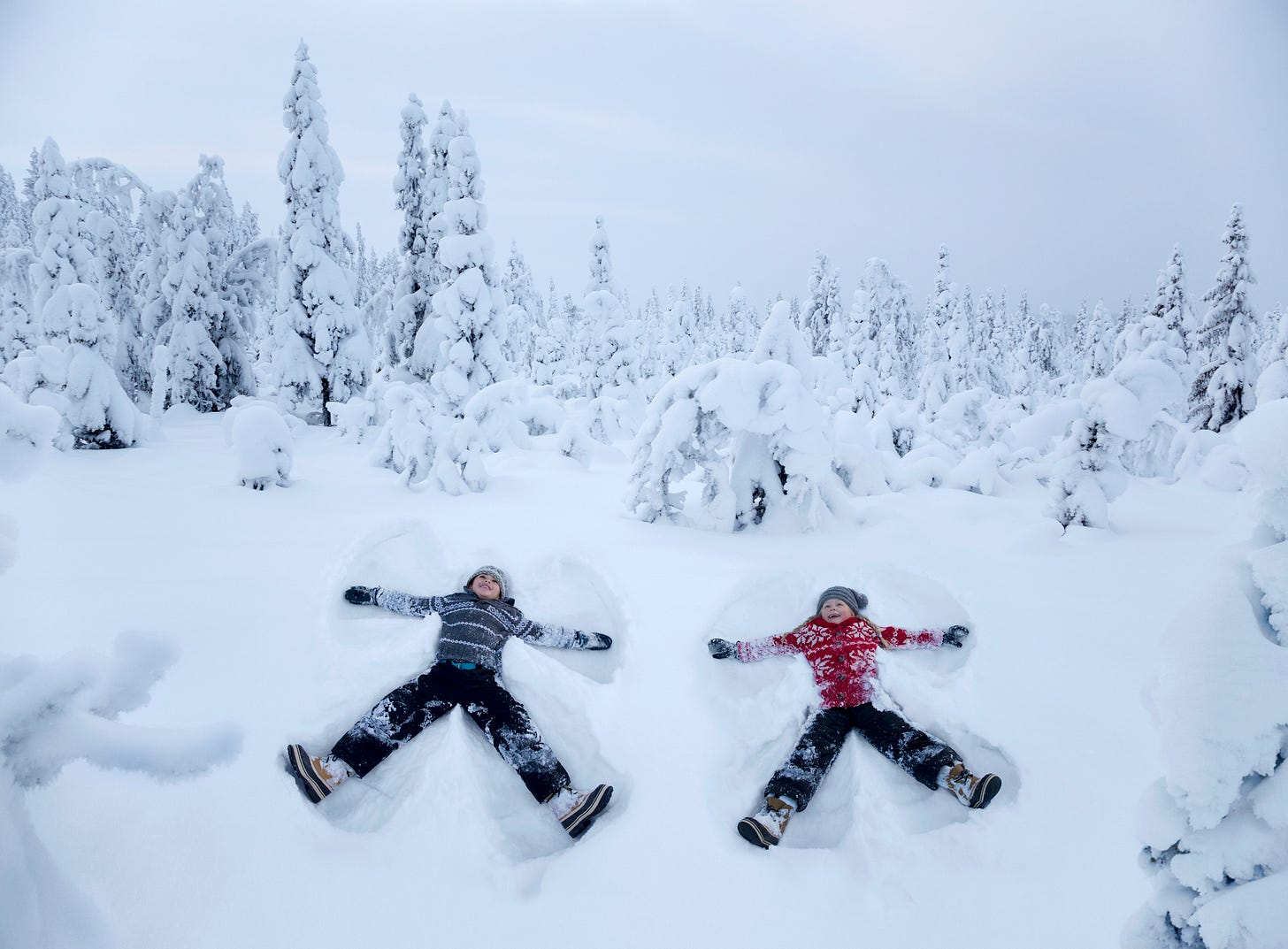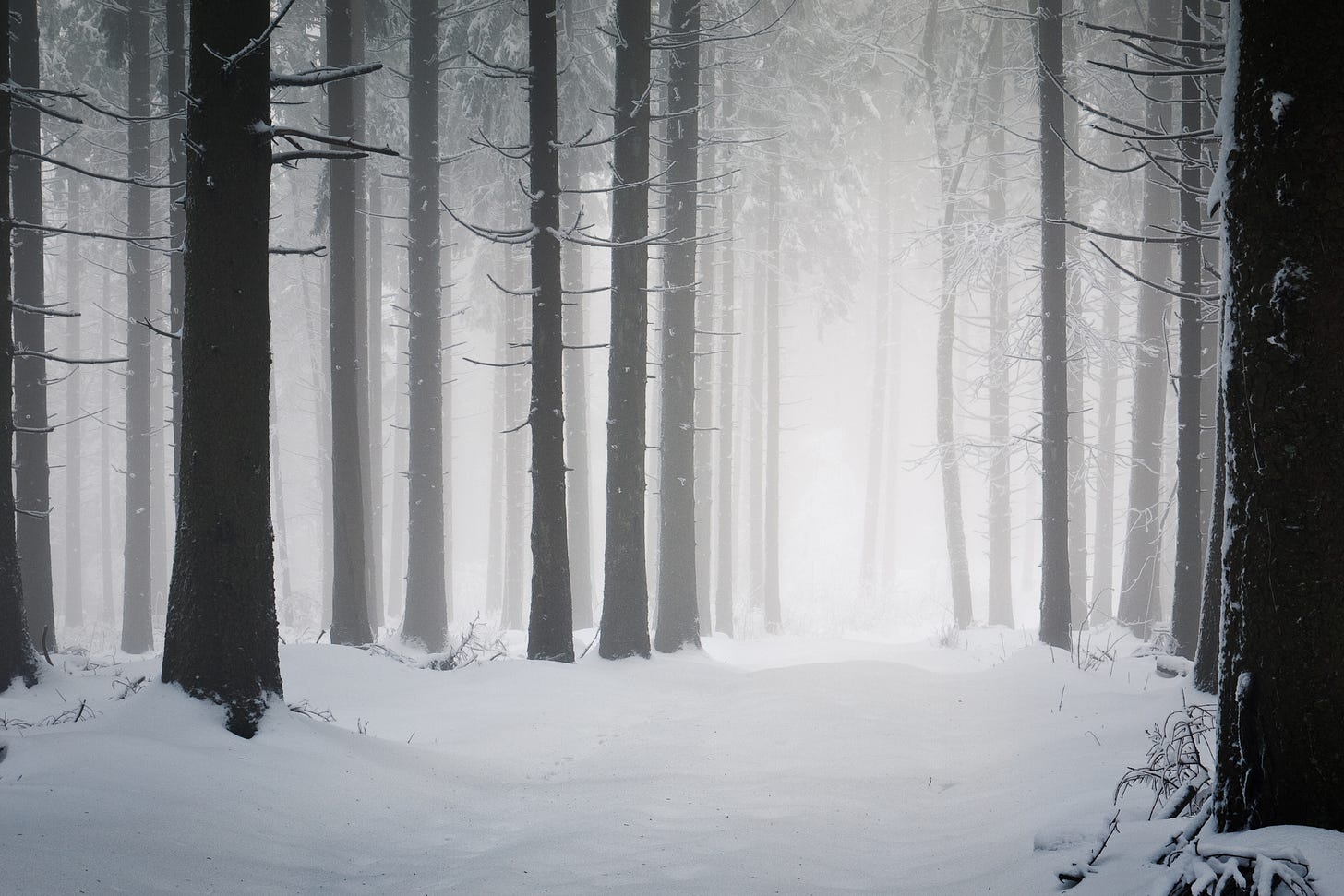There is Something Deeply Spiritual About the Woods in Winter
On the stages of life and the endurance of the forest.
The winter wood is like a strong old man,
Grizzled, rugged, and gray,
With long white locks tattered by many storms.
He lifts gnarled arms defiant of the blasts,
And rears his old head proudly
Under the menace of the winter sky.
“Winter Woods,” by Eleanor Hammond
As a child, the two weekends each month that I spent at my father’s house were emotionally tortuous, for a multitude of reasons better left unspoken. For the week leading up to my visitations, I would frequently suffer from anxiety-induced stomach aches, and once there, I would anxiously grind through the weekend, looking forward to my return “home” on Sunday afternoon. My return trips were always bittersweet—relief at the thought of being back in the company of my mom, in my bedroom, with my things; but mixed with a touch of sadness that I wouldn’t see my father again for two weeks. Having recently passed the third anniversary of my father’s death, the regret I feel at my reminiscences of this fraught dynamic is immense and intense.
But, tangled up with these painful memories is a singularly bright spot, a cadre of experiences, built over a number of years, that stand out as wonderful and formative. My father lived in an old house at the very edge of a tiny town (Hidalgo, Illinois, for those interested). Directly opposite his house was a massive bean field, beyond which lay a dilapidated old baseball field, its back fence rusted and tortured by time into a deformed remnant of its erstwhile self, and its infield entirely atrophied into rough patches of vegetation, interspersed with the occasional whispers of dirt—a glorious reminder that, in the end, nature always wins. But just behind that field was a woodland area that, in the desperate heart of this young boy, may as well have been infinite.
Into the woods
Over the gray Saturdays of winter, when there was little else to do, my brothers and I would very often wake up, pack some necessities, and then disappear into the woods for the whole of the day. These necessities would include a lunchbox with sodas and sandwiches, our survival knives (of course), and my BB gun. This latter was a safety measure, in case we should ever be accosted by a bloodthirsty critter (we never were). Once in a while, I would take a book. We would don our winter garb—our coveralls, rubber snow boots, stocking caps, etc.—and venture forth, trudging first across the high-humped rows of the bean field, then to the ball diamond, then the woods, almost our own miniature journey into the heart of darkness, progressively leaving behind the world of man and foraying into the wild and unknown.
If memory serves me, this habit began as a casual suggestion posed by one of my brothers, one option among a few, one morning when we were all sitting around pondering the age-old question of all small children, “What do you want to do today?” But once begun, these expeditions became a regular winter Saturday event for my brothers and me. Each time, we would trace a slightly different path, pursue a line we hadn’t pursued before, extend our journey deeper, tarry in different places.
We would stomp for a while, then pause to eat our sandwiches and drink our sodas. Once finished, we might set up our cans on a distant hill and shoot BBs at them for a bit. We might climb down into the ravine that ran alongside the old railroad tracks in search of treasures. Or hunt for mushrooms. I might sit a while on a fallen tree to read, while my brothers explored. Trudge, discover, and absorb, basking in the stillness and the majesty of creation. Every trip something new. I remember the Saturday morning that was so intensely cold that we actually walked first into town, pausing for a bit at Bob’s Hardware Store.
Bob always had a small wood-burning stove in his store, around which some of the old men in town would often gather, sipping their coffee. That morning, it was my brothers and me, fortifying our bodies with the warmth of the fire in preparation for our journey. This detour then compelled us to follow our wooded path in reverse. I remember the Saturday when we walked so far into the woods that we emerged at the edge, near the highway, marveling at how far we’d managed to walk, but also promising amongst ourselves not to tell our father just how far we’d gone.
From loneliness to holiness
These adventures took me away from the loneliness I always felt in the house, a loneliness that was always exacerbated by the stifling cold and shortened days of winter. But this was far more than a simple escape. It was holy. There is something deeply spiritual about the woods in winter. Part of it, I think, has to do with the fact that the wintry wood provides us with a striking reminder of the power of nature itself.
The bitter stillness of the air, the hard, unforgiving, seemingly fallow earth, the trees cragged and shorn of their vernal finery—even the browns of the trees are ash gray; and yet, amidst this apocalyptic milieu, the trees whisper to us their silent verse, reminding us that they endure, that they will bring forth their greenery once more, that the sunlight, absent at the moment despite the dearth of leaves overhead, will soon overwhelm us again, powering through even the most densely verdant spaces, that the area, seemingly empty of all life, will soon teem with vitality again.
This immersion, the promise of life in death, evokes a contemplative comportment. As a man now at the approximate middle of life, I look back and wonder if that may not have been what my father, in his own way, loved so much about being in the woods in winter, even if he was never able to quite put it into words.
Through these Saturday adventures, my loneliness would temporarily abate, and very often, that sense of joy would carry me through the remainder of the weekend. This had partly to do with the shared sense of freedom my brothers and I felt; freedom from parental grumpiness and oversight, freedom to waste time as we pleased, to eat when we wanted to eat, pause when we wanted to rest, to be as loud as we wanted, etc.
Familiarity, novelty, and discovery
But it was something deeper, in that the wood itself became very much my friend, complete with a personality all its own, each visitation offering that wonderful mélange of familiarity, novelty, and discovery, attendant to all meaningful friendships. Differences in the topographical contours, the configurations of branches, variations in ridges, the trees in various stages of life, the endurance of the forest through all its permutations and becomings.
Each of our encounters brought me to a deeper understanding of the wood; and likewise, they deepened my own sense of myself, providing comfort amidst all the turmoil of my early teenage years, reminding me that beneath all of life’s unpredictability, chaos, and pain, there nevertheless remains the promise of profound beauty, the hope of rebirth and renewal beyond the monochromatic ashen hues of winter. Well into my adult life, and though I’ve not been in those woods in probably three decades, that friendship remains one of tremendous significance.
Strange as it may sound, those wooded winter days are the closest I can come, in my mind, to a conception of heaven. That oceanic sense of communion, both transcending and affirming the self, ever beckoning. I suspect this is what the poet Robert Frost meant when he wrote, in his famous “Stopping by Woods on a Snowy Evening,”
The woods are lovely, dark and deep,
But I have promises to keep,
And miles to go before I sleep,
And miles to go before I sleep.









I was drawn to hike the Appalachian Trail with my younger son, Jonathan, when he was 13 and I was perhaps 48. We overnight-backpacked across Cove Mountain toward Boiling Springs PA with stunning views of the mighty Susquehanna.
Your essay reminds me of why. The woods behind my family’s house on South Bass Island, Ohio (in my youth) was deep and magical. As a later suburbanite, I was hungry to recapture with Jon that lonely, wintery magic you so vividly describe, Vern —with a son I saw too little of.
It worked. He completed the AT as a through-hiker (2200 miles) before he graduated college. He went well beyond me: every father’s dream.
Thank you for your personal reflections on the renewing, transcendent powers of hiking in a vast, sometimes scary woodlands with your brothers.
All fathers should steer their curious sons and daughters into the mysterious back woods if they dare. Life lessons of friendship, courage, and independence abound there.
What a lovely essay! A tribute to resilience and the eternal promise of eternal life. The imagery and the feelings are so vivid. Thank you for sharing.